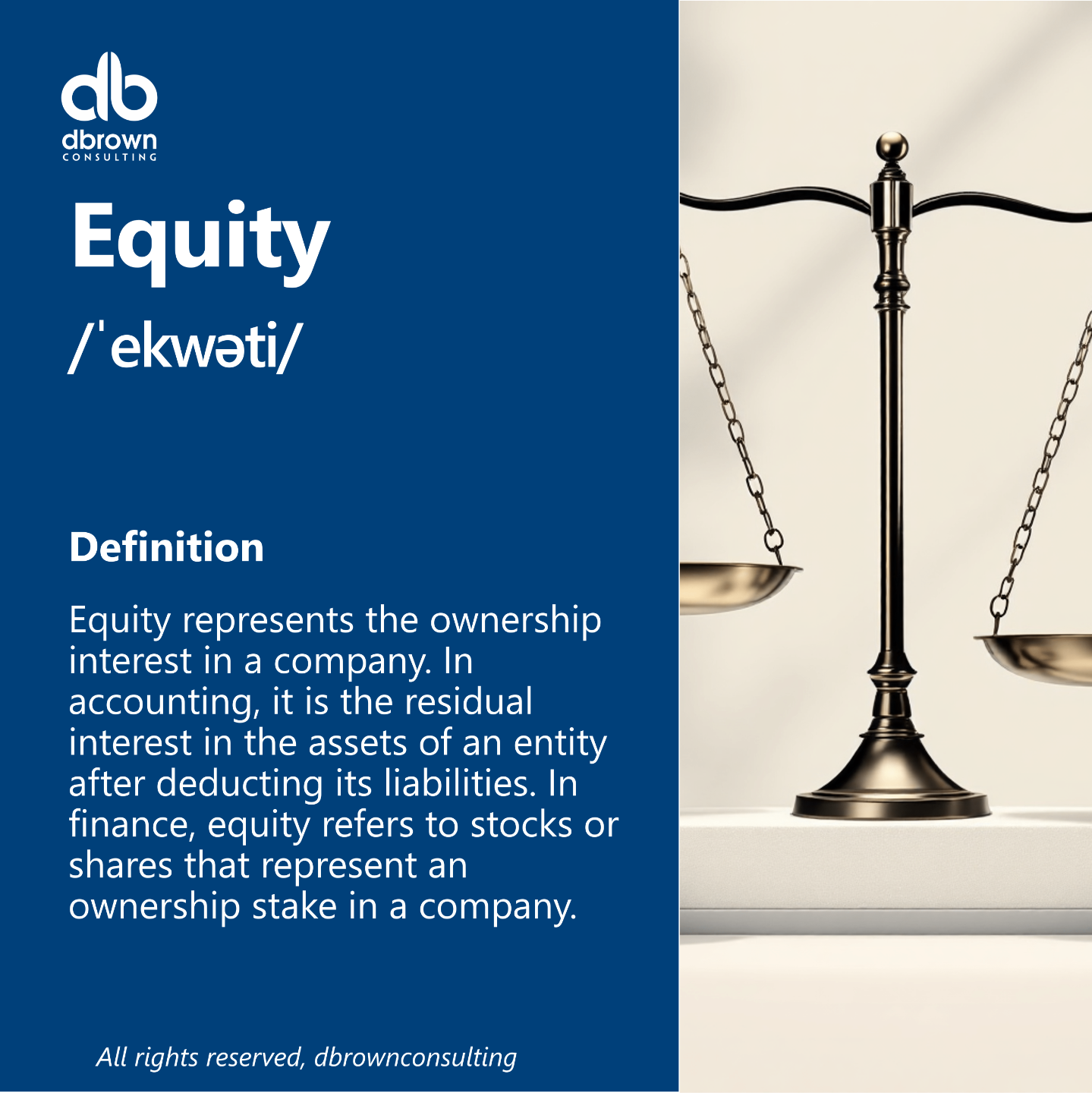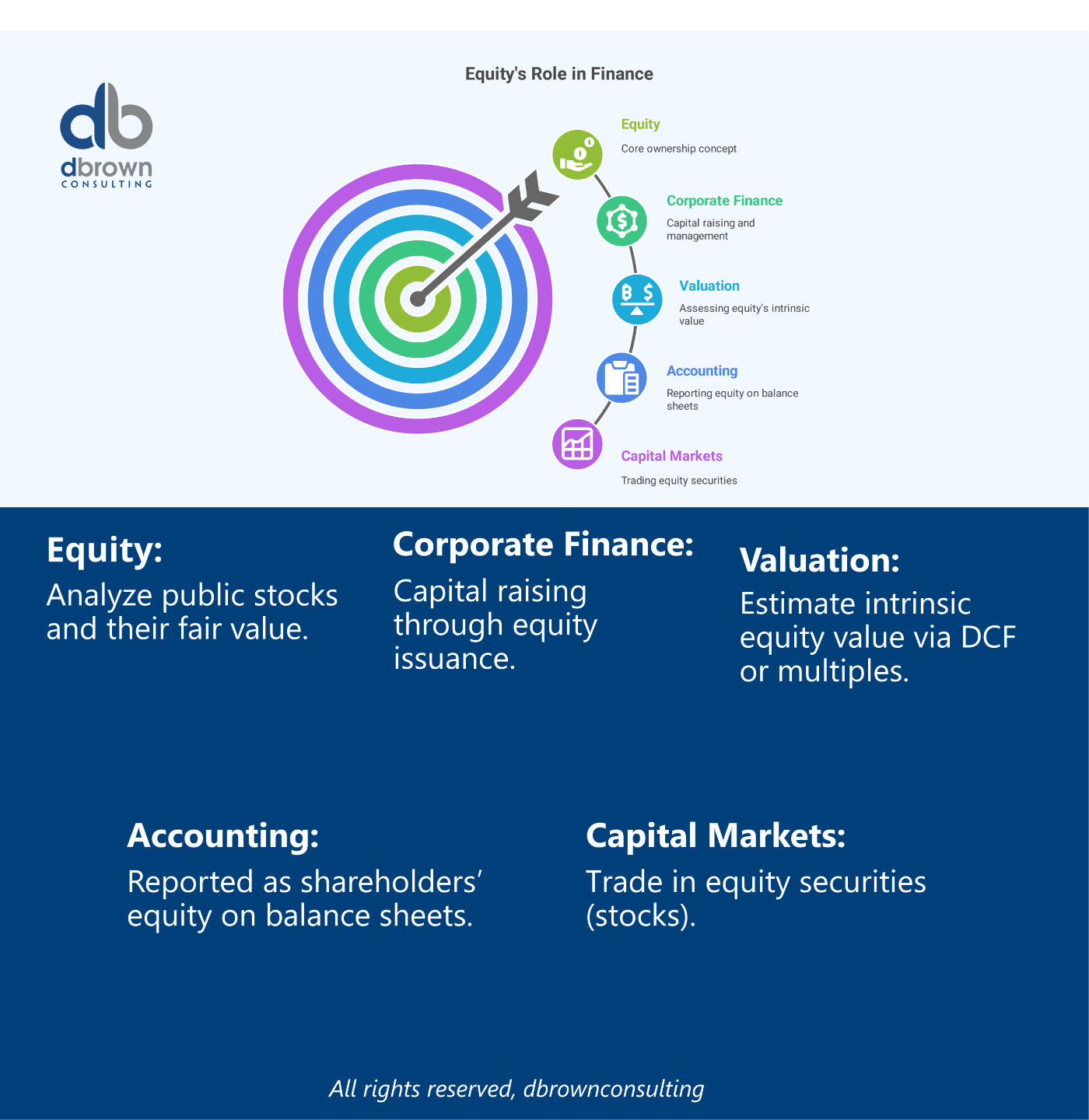EQUITY
Definition
Equity represents the ownership interest in a company. In accounting, it is the residual interest in the assets of an entity after deducting its liabilities. In finance, equity refers to shareholder value, and in markets, it refers to stocks or shares that represent an ownership stake in a company.
Mathematically:
Equity=Assets−Liabilities
Origins
The term stems from the Latin aequitas, meaning fairness. It gained prominence during the evolution of corporate entities in the 17th and 18th centuries (e.g., East India Company), where owners received shares in the business in exchange for their investment—introducing the modern concept of shareholder equity.

Usage
ndustry Applications:
-
Corporate Finance – Capital raising through equity issuance.
-
Valuation – Estimate intrinsic equity value via DCF or multiples.
-
Accounting – Reported as shareholders’ equity on balance sheets.
-
Equity Research – Analyze public stocks and their fair value.
-
Private Equity – Invest in and restructure private companies.
-
Capital Markets – Trade in equity securities (stocks).
How Equity Works
Forms of Equity:
-
Common Equity – Ordinary shares with voting rights and residual claims.
-
Preferred Equity – Hybrid instruments with fixed dividends and liquidation preference.
-
Owner’s Equity – For private or partnership entities.
-
Book Equity – Accounting value from financial statements.
-
Market Equity – Market capitalization (shares × market price).
Components of Shareholders' Equity:
-
Common Stock – Par value of issued shares.
-
Additional Paid-in Capital (APIC) – Amount paid above par.
-
Retained Earnings – Cumulative net income retained.
-
Treasury Stock – Shares repurchased by the company (reduces equity).
-
Accumulated Other Comprehensive Income (AOCI) – Unrealized gains/losses.
Key Takeaway
-
Equity represents ownership and claim on residual value.
-
Can be measured via book value or market value.
-
Affects company’s capital structure and cost of capital.
-
Equity holders bear the highest risk, but also potential for highest returns.
-
Equity value is key to investor returns, ROE, and valuation multiples.

Types of Equity
| Type | Description |
|---|---|
| Common Equity | Ownership stake with voting rights; residual claims. |
| Preferred Equity | Fixed income-like; priority over common equity. |
| Private Equity | Ownership in private, non-listed firms. |
| Venture Equity | Startup funding with high risk/high return. |
| Home Equity | Owner’s interest in real estate (Home Value – Mortgage). |
Context in Financial Modeling
Equity plays a core role in:
-
Valuation:
-
Leverage Ratios: Debt-to-equity, interest coverage.
-
ROE Calculation: Measures profitability to equity holders.
-
Capital Structure Analysis: Optimize debt vs. equity.
-
Sensitivity Analysis: Impact of changes in revenue, margins, or WACC on equity value.
Nuances & Complexities
-
Book Value ≠ Market Value: Book equity may not reflect a company’s true value (e.g., brand, IP, growth).
-
Dilution Risk: New equity issuance dilutes existing shareholders.
-
Negative Equity: When liabilities exceed assets—common in distressed firms.
-
Convertible Securities: May transition from debt to equity, affecting ownership.
-
Minority Interest: Part of equity not owned by the parent in consolidated financials.
Mathematical Formulas
1. Book Value of Equity:
2. Market Capitalization (Market Equity):
3. Return on Equity (ROE):
4. Equity Value from Enterprise Value:
Master Financial Modeling with the FMA
Change your career today by earning a Globally Recognized Accreditation
Develop real-world financial modeling skills, gain industry-recognized expertise, stand out and start earning more by gaining the Advanced Financial Modeler (AFM) designation from the Financial Modeling Institute.
Our expert-led online cohort based program covers everything you need to become a world class financial modeling pro and advance your career in finance.
Related Terms
-
Assets
-
Liabilities
-
Capital Structure
-
Enterprise Value
-
Book Value
-
Market Capitalization
-
Dilution
-
Retained Earnings
-
Shareholder Returns
Real-World Applications
1. Public Company Valuation
Apple Inc. (AAPL) equity value = ~$3 trillion (share price × outstanding shares), guiding investor returns and index weight.
2. Private Equity Investment
A PE firm acquires 70% of a company’s equity and aims to grow EBITDA and reduce leverage to increase exit equity value.
3. Capital Raising
A startup raises $10 million by issuing 20% new equity, diluting founders but fueling growth.
4. Financial Distress
A company with negative equity signals risk of insolvency and may face higher financing costs or bankruptcy.
References & Sources
Unlock the Language of Finance!
Elevate your financial acumen with DBrown Consulting’s exclusive newsletter. We break down complex finance terms into clear, actionable insights—empowering you to make smarter decisions in today’s markets.
Subscribe Today & Make Financial Jargon Simple!
We won't send spam. Unsubscribe at any time.

